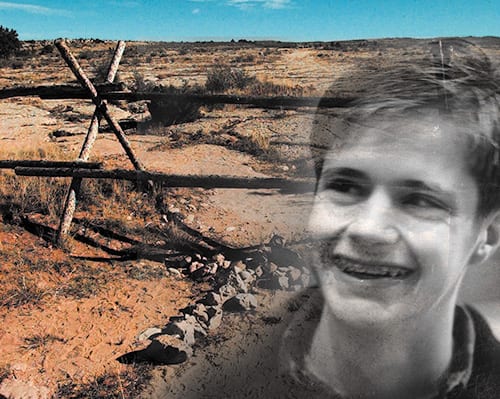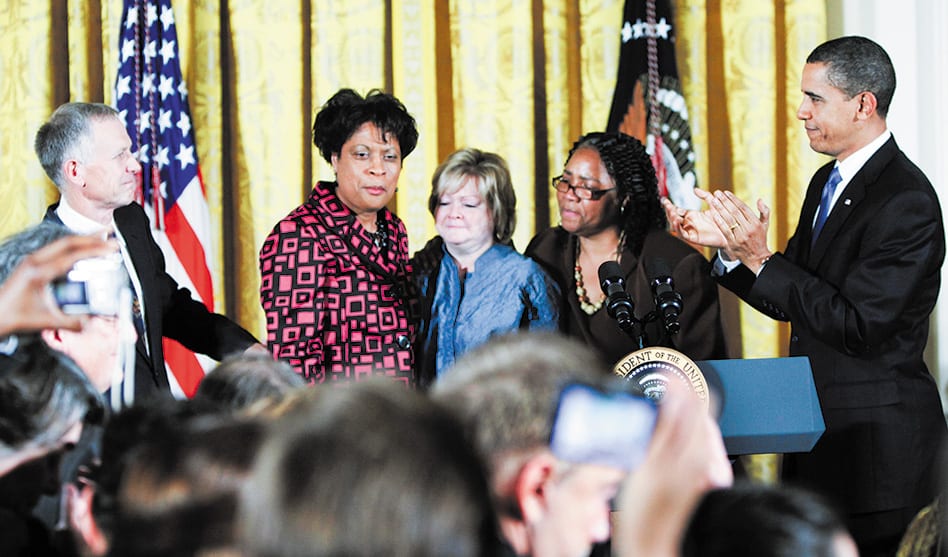President Barack Obama, right, leads applause to the parents of Matthew Shepard, Dennis Shepard, left, and Judy Shepard, center, and James Byrd Jr.’s sisters, Louvon Harris, second left, and Betty Byrd Boatner, second right, during a White House reception commemorating the enactment of the Matthew Shepard and James Byrd Jr. Hate Crimes Prevention Act, on Oct. 28, 2009. This week, Judy Shepard said she believes the country is going backwards in terms of fighting hate crimes and bigotry. (Manuel Balce Ceneta/Associated Press)
As she plans a visit to Dallas, Judy Shepard talks about keeping up the fight and the importance of voting
Tammye Nash | Managing Editor
nash@dallasvoice.com
“This year, in October, we will have been without Matt for as long as we had Matt,” Judy Shepard said in an interview this week, noting that Oct. 10 will mark 20 years since her son was beaten, tied to a fence outside Laramie, Wyo., and left to die in the most infamous anti-gay hate crime in U.S. history.
“Sometimes, it seems like it was 100 years ago. And sometimes, it seems like it was just yesterday,” said Judy, who with her husband, Dennis, co-founded the Matthew Shepard Foundation after their son’s murder to “erase hate by replacing it with understanding, compassion and acceptance.”
But although they’ve seen much progress in the years since, Judy said every day she is reminded how far we have yet to go. The last year has been especially trying, she said, noting that hate crimes and discrimination are again on the rise since Donald Trump was elected president.
“It’s very frustrating because we’ve not come any further than this,” Judy said. “I thought we were on the right path. We were making progress. But we made a wrong turn and it seems we’re headed the wrong way now.”
 The crime
The crime
Matt Shepard had only recently moved to Laramie to attend the University of Wyoming when he decided to go to a local pub, The Fireside Lounge, for the evening. It was in the early morning hours of Oct. 7, 1998, when two men — Aaron McKinney and Russell Henderson — lured Matt away from the pub to rob him. They drove him out to the countryside, tied him to a fence and beat him, using the butt of a .357-caliber handgun as a weapon.
The two then drove away, leaving Matt tied to the fence in near-freezing temperatures, just barely clinging to life. Eighteen hours later, a passing bicyclist found him, although the cyclist said he nearly rode on by, thinking that it was a scarecrow that he saw and not a human being.
Matt Shepard was rushed to Poudre Valley Hospital in Fort Collins, Colo., where he lay comatose for four days, suffering from brain injuries and severe hypothermia, before being pronounced dead at 12:53 a.m. on Oct. 12.
Shortly after, Henderson and McKinney were arrested and charged with Matt’s murder. At trial, McKinney’s own defense lawyer said that McKinney had only intended to rob Matt but became enraged when Matt made a pass at him. McKinney’s girlfriend also said that his hatred for gays played a role in the killing, although she later recanted, claiming she had only said that because she thought it would help McKinney’s case.
Henderson pleaded guilty, striking a deal to testify against McKinney to avoid the death penalty. McKinney was found guilty at trial. Both men were sentenced to two consecutive life sentences.
The foundation, the law and the fight against hate
Matt’s murder set a new life course for his parents. Judy and Dennis Shepard have made it their mission for the last 20 years to combat hate with love.
“I was so idealistic back then,” Judy said this week. “I thought if people could just get to know gay people, it would be different. I thought, if they just knew who these wonderful people really are, it would all be OK. If I hadn’t lost Matt, I would be that PFLAG mom in the kitchen making cookies now, not the mom at the podium” fighting for change.
It didn’t take long, in the years following Matt’s death, for Judy Shepard to realize that it would take more than just non-gays getting to know LGBT people. In fact, it took 11 years for Congress to finally pass a comprehensive hate crimes law. President Barack Obama finally signed the Matthew Shepard and James Byrd Jr. Hate Crimes Prevention Act — named
after Matt and the African-American man dragged to death in an equally horrific hate crime in June, 1998 in Jasper, Texas — into law.
Still, slow as it was, Judy said, “We were making progress.”
Then came November 2016 and Donald Trump’s election. In the year-plus since he took office, Judy said, “the haters have been given permission to voice their hate, to be right up front about it without worrying about facing any consequences.
Why should they? No one in the White House suffers consequences for any of the hateful things they say and do.
“It’s all the federally-protected minorities, the fringe folks, who are targets now,” she continued, “the Muslims, the ones targeted because of their origins, their race, their orientation, their gender. It’s just heartbreaking to think that folks think this [hateful bigots] is what we are now, what we’ve always been. This is not the America I know. It’s not where I want to live.
“We all need to stop and realize, we are all an ‘other’ to somebody else. We’re all different somehow. It’s just heart-breaking to see so much hate.”
Getting back on the right path
Still, Judy Shepard has hope. “I have to have hope we can get better, just to get through the day,” she said.
“We can get back on the right path,” she continued. “But we will have to do it without the help of the federal government” which has in the past year given the haters not only permission to stop progress but to move instead in the other direction.
This time though, “we are organized now,” Judy said. “We have our voices now, and we know how to use them. People know who we are.” Judy and Dennis and the Matthew Shepard Foundation are using their voices in a number of ways right now. Productions of The Laramie Project, a play about the response in Laramie to Matt’s murder, “are one of a handful of things we officially endorse now,” Judy said. Another is Considering Matthew Shepard, the three-part oratorio written by Craig Hella Johnson and performed by Austin-based Conspirare, which will be performed next Wednesday, Feb. 21, at Moody Performance Hall in Dallas.
“But our main focus right now is hate crimes conferences,” Judy said. “We are working on educating the public and law enforcement on how to recognize and report hate crimes. We’re working with the non-government agencies and nonprofits. We used to have the support of the Department of Justice and the Attorney General. We don’t have that anymore. That’s another setback.”
That can change again, Judy said. But it will take everyone working together to make that happen.
“I think people understand now that they got complacent, even lazy,” she said. “People were not paying attention. I heard a lot [in the 2016 election cycle] about how one candidate was just as bad as the other, so people weren’t going to even vote. But you have to pay attention; one candidate is always worse than the other.
“I blame the people who didn’t bother to vote at all for the mess we’re in now,” she continued. “I hope that this [past year] has truly shaken them to their core. It’s got to be a wake-up call.
“Y’all have got to vote,” Judy insisted. “You have to register and you have to go vote. You have to go through all the nonsense that includes. We need to have automatic registration — when you turn 18, you are automatically registered to vote. That would solve some of the problems. Make Election Day a holiday or put it on a Saturday — anything to make voting easier. We have to educate people, give them a civics lesson, because we all need a general idea of how this works.
“We have to organize,” she said. “We have to stay in tune. Know what’s real and what’s not. Pay attention. Really pay attention. You still need to be out there, using your voice. You just cannot be silent now.”
For more information about Matthew Shepard, Judy and Dennis Shepard and the work of the Matthew Shepard Foundation.














